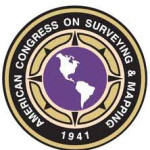- Industry: Earth science
- Number of terms: 93452
- Number of blossaries: 0
- Company Profile:
Founded in 1941, the American Congress on Surveying and Mapping (ACSM) is an international association representing the interests of professionals in surveying, mapping and communicating spatial data relating to the Earth's surface. Today, ACSM's members include more than 7,000 surveyors, ...
A body which, described in terms of zonal spherical harmonics, contains a third degree term of appreciable size and no higher-degree terms of comparable size. The Earth has for this reason been called pear shaped.
Industry:Earth science
An assemblage of two equal cameras placed so that their optical axes are parallel to each other and are perpendicular to the line joining their inner focal points. If the cameras are both capable of taking pictures that can be treated photogrammetrically to give accurate results, they are often called a stereoscopic camera.
Industry:Earth science
A transparent sheet to which material to be copied or used as masking is fastened.
Industry:Earth science
Any device changing the input to it in a predictable manner but whose inner workings are unknown to the user.
Industry:Earth science
A bench mark the elevation of which has been established by trigonometric leveling.
Industry:Earth science
A field sheet or smooth sheet on which intersecting families of curve are shown, each curve corresponding to the locus of points at which some constant angle exists between two stations.
Industry:Earth science
Calculation of the value of gravity on a surface lying 100/g kilometers above the Earth's surface.
Industry:Earth science
A star catalog, compiled by F. W. A. Argelander, of over 324,000 stars, accompanied by a chart and having location and approximate magnitude of each star. Usually referred to as the BD (sometimes as the Argelander catalog or the Bonner Durchmusterung star catalog). The catalog shows practically every star brighter than 10th magnitude and north of 2<sup>o</sup> declination, and has served as the basis for many later catalogs, as well as having been used as a source of stars to be used in programs for deter-mining latitude or azimuth. Various astronomers have extended the catalog southward. It is now superseded by the Smithsonian Catalog.
Industry:Earth science
